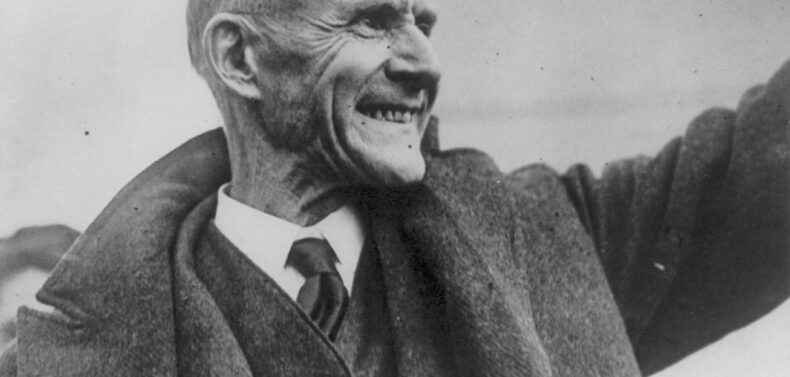A presidential candidate was photographed and fingerprinted at a jail in Atlanta while his campaign hawked merchandise featuring the candidate’s prison photo. The candidate vowed to pardon himself if elected, and his supporters promised to vote for him no matter what. The year was 1920, and perennial Socialist Party presidential candidate Eugene V. Debs was behind the walls of Atlanta Federal Penitentiary. The candidate had campaigned for president under the Socialist banner in 1900, 1904, 1908 and 1912.
In 1920 Debs was in jail for his fiery speeches opposing World War I, but he campaigned from his jail cell, garnering nearly a million votes in an impressive though unvictorious third party run. His campaign sold prison-themed Debs merchandise, including buttons with a photo of Debs in his prison uniform and the slogan “For President Convict No. 9653.” Other Debs memorabilia included small metal statues of the candidate clad in his convict clothing.
Democrat Woodrow Wilson had been re-elected in 1916 with the slogan “He Kept Us Out of War,” but by 1917 America had entered the war. Debs and many of his anti-war supporters were jailed under harsh sedition laws, and Wilson vowed that he would never pardon a “traitor” like Debs. The story had a happy ending when the GOP’s Warren Harding became president after defeating Democrat James Cox in the 1920 election. Just in time for Christmas in 1921, Harding commuted Debs’ sentence, and the old activist walked out of the prison gates after serving nearly three years behind bars. Debs merchandisers were quick to publish photos of the beaming candidate doffing his hat in a gesture of farewell outside the Atlanta prison walls. In all of his mugshots and merchandise, Debs looks serene, saintly and smiling—unlike the glowering jailhouse image of Donald J. Trump seen by millions recently and by readers of history forevermore.
The same Harding who sprang Gene Debs from jail would himself be caught up in legal and personal quagmires that threatened to sink his presidency. His untimely death in 1923 spared Harding from later public revelations about his womanizing ways and the Teapot Dome oil scandal during his administration. Fifty years later, the spotlight of scandal shined again on the White House as Richard Nixon’s promises of law and order turned into the lawless disorder of the Watergate scandal that led to his resignation in 1974.
Nixon’s resignation kept him out of jail and preserved his post-presidential perks and pension, but history books will always record him as the only president to resign the office in the face of impeachment and a possible prison term. Unlike those in today’s political cult of Trump, many Republicans during Nixon’s time joined in the national call to oust a criminal president who made a mockery of his party’s slogan of law and order.
On April 27, 1974, I was in Washington during what The Washington Star called “the first large-scale march” in the nation’s capital calling for Nixon’s impeachment. Ten thousand people turned out on a sunny spring day to urge that the president be held accountable to the rule of law. Chanting “Throw the bum out” and “Jail to the chief,” the crowd followed behind an Edsel automobile towing a faux jail cage with a man inside wearing a Nixon mask and a striped convict uniform. A sign on the Edsel said, “Don’t trade a lemon for a used Ford.” The advice went unheeded as President Gerald Ford pardoned his predecessor, Nixon, just a month after Nixon’s August 9, 1974 resignation. Ford’s pardon of Nixon was widely seen as a factor in his defeat by Democrat Jimmy Carter in the 1976 election.
Trump’s legal woes are far more troublesome than those faced by his predecessors Bill Clinton, Nixon and Harding, and Trump’s campaign style bears none of the courtly dignity and selfless sacrifice shown by Debs. Still, Trump’s indictments are just incitements to his MAGA minions who send the money and buy the merchandise to keep the Trump train rolling. Trump and his crew could be back in the White House unless voters in 2024 heed George Washington’s sage advice from 1796: “Guard against the postures of pretended patriotism.”
Like what you just read? Support Flagpole by making a donation today. Every dollar you give helps fund our ongoing mission to provide Athens with quality, independent journalism.










